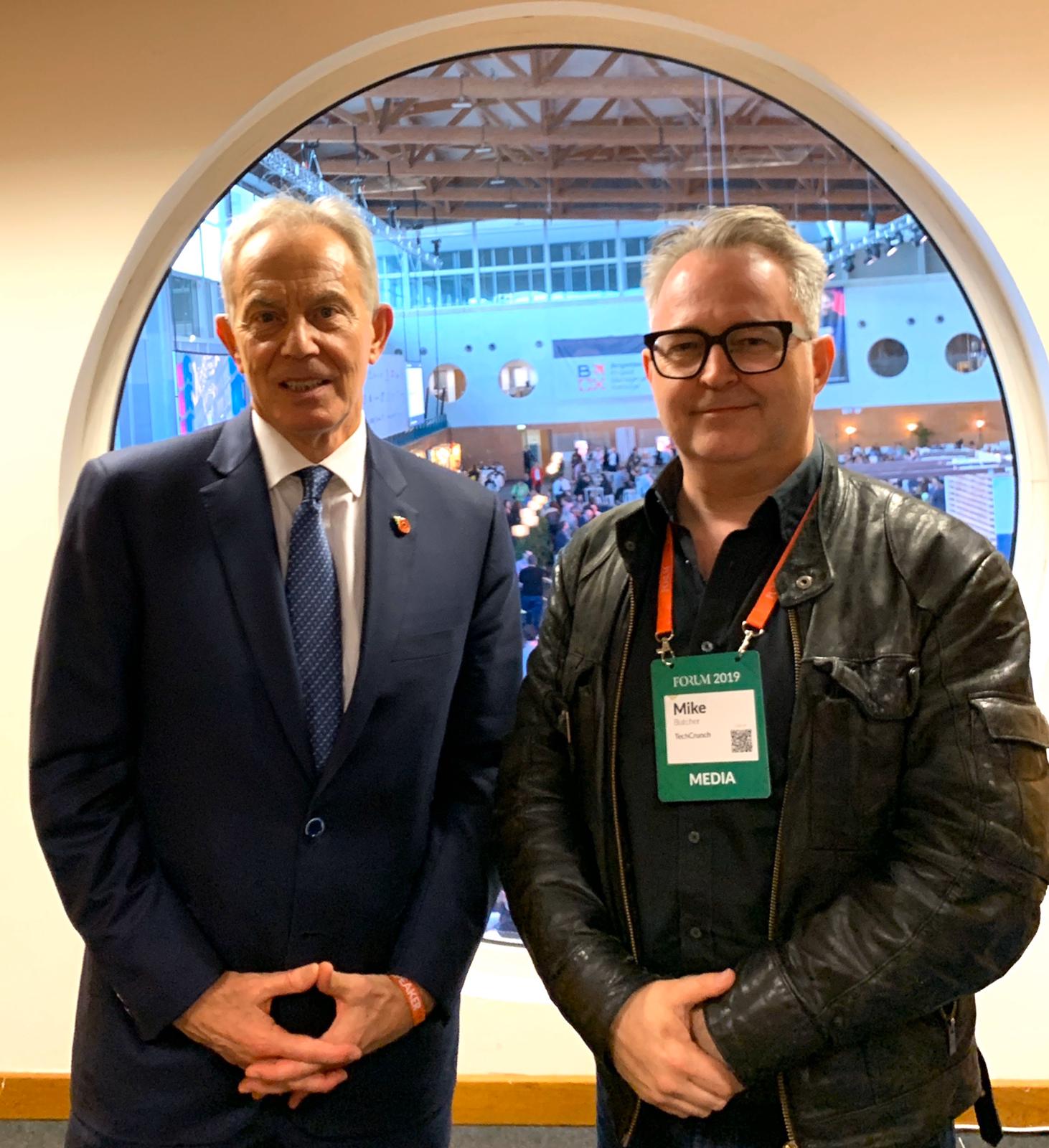As history tells us, the break-up of “Big Oil” and “Big Telco” in the past led to more competition and innovation. What to do in the era of “Big Tech?” Living in 2019, we know more than ever before about how Big Tech, particularly in the shape of Facebook, Twitter and Google — as the prime arbiters of information and social media online — have shaped and affected politics today. At the same time, we’re about to face several huge sea-changes in the global system, not least of which will be the next U.S. election, Brexit, the rise of China and challenges of the climate crisis.
Speaking at Web Summit in Lisbon this week, former U.K. Prime Minister Tony Blair brought out a new report from the Institute which bears his name to address the turmoil of Western politics from the prism of the backlash against globalisation after the 2007-2008 financial crisis, the rise of populist movements and the effects technology is having on society, politicians and policymakers.
A policy framework designed for the offline world may have served many people well for many decades, but in an age of exponential technology, is it fit for purpose?
Platform companies like Facebook, aggregators like Google, Amazon and Uber have, says the Institute, stripped traditional gatekeepers of their power, delivered real progress for consumers and businesses and increased many freedoms. But they have also brought significant economic upheaval and heightened cultural pressures, along with huge unknowns about the future. The tech wolf has also now concentrated power in the hands of a relatively small number of companies that “all too often wield it clumsily and without sufficient legitimacy.”
This comes at a time when the West’s lead on technology is “facing a clear and present challenge from determined Russian aggression and a concerted push from China to take a global lead in AI.”
Blair’s Institute makes it plain in its new report (“A New Deal for Big Tech: Next-Generation Regulation Fit for the Internet Age”) that the current set of regulations designed for legacy industries is “a poor fit for the pace and scale of the Internet” and a new approach, based on stronger accountability coupled with more freedom to innovate, might be the best way to align private incentives with the public interest.
Blair is calling for a “new generation of regulator” that can take an international outlook, have technical expertise comparable with the big tech companies and be fluent in the same fundamentals of “Big Tech.”
But how? How is all this going to operate? What are Blair’s views on Russia, disinformation on Facebook and Twitter, and whether tech will have an effect on the outcome of Brexit?
TechCrunch sat down with Mr Blair for the following, exclusive, interview.
Mike Butcher (MB): You’ve released this new report into regulating Big Tech. Do you want to outline its main thrust?
Tony Blair (TB): Essentially what we’re saying is: there’s no way “big tech” is going to avoid regulation, and regulation that will treat them almost like public utilities because of their power, their reach and their impact. But the question is about getting the right form of regulation. So what we’re trying to do is to make sure that it’s the kind of regulation of big tech that recognizes that [big tech has] actually brought enormous benefits to people, but at the same time protects people, whether it’s on issues around privacy, competition [and] making sure that consumers get adequate access — all of those types of things — and translate this into a set of proper principles. What I say to the big tech companies is that even though you may not want to have a lot to do with politics, as you can see — and I’ve been saying this for several years to them — it’s going to come your way. Because you’re just too powerful not to be under some system of objective regulation, and you can’t just regulate yourselves.
MB: On that note, many big tech companies have actually called for regulation, but do you think that’s a “sop” to governments in order to allow them to build even bigger monopolies? Because then everybody will have to be regulated, including smaller companies?
TB: I think the whole point about regulation is that it can be bad or it can be good. So you really want to make sure that the regulation you’re introducing is not an imposition on the companies for providing the service they do, but it is giving people proper protection and it’s recognizing, as I say, the power that these companies have. People won’t find it acceptable that things continue without proper regulation. The fact that Mark Zuckerberg comes out in favor of regulation… I mean, I think that’s good. But the question is what type of regulation. And there, obviously, he and Facebook should have an input. But they can’t decide that. That’s — in the end — got to be decided by policymakers. And one thing my institute — which Chris [Chris Yiu, executive director, Technology and Public Policy] heads up, which is based in London but has strong links in Silicon Valley and elsewhere in the world — is to say there needs to be a dialogue between what I call the “change-makers” and the policy-makers that leads to good policy.
MB: But national governments making policy on their own surely isn’t going to address the issue, given Big Tech is global? What institutions can address this? Some sort of supranational body?
TB: Well, I think, ultimately, on certain issues you’ll need a global agreement. For example cybersecurity, I think we’ll, for sure, need that.
MB: There’s no “United Nations Declaration” for arms control on cybersecurity for instance.
TB: The one thing I’m noticing about cyber, even in the last year… the number of people I meet whose companies have been subject to actual attacks… In the end, if every country is going to want to protect its business and every country will recognize ultimately that if the big players don’t come together and agree some rules then… I mean, it’s just anarchy.
In regards to regulation, I would like to see Europe and America create a new transatlantic partnership around regulation. This is one of the reasons I’m so opposed to Brexit… You are taking Britain out of that conversation with Europe at the very time that it needs to be in it.
MB: The pace of change at this point is now exponential. The rise of AI, quantum computing etc. Politicians have known about the rapid, changing nature of technology for a number of years. What do you think has been stopping them from grappling with the subject?
TB: It’s partly generational. It’s partly because politicians don’t often understand the technology. It is actually technical. It requires hard work. Some of it is like rocket science. It’s not easy. So that’s part of the problem. And the other problem is that I think the change-makers — the tech developers — their basic attitude, often, to government, is just to just “keep away from it.” And I completely get it. But it’s not sensible. They’ve got to engage with government today, and that’s why we’re trying, through the Institute, to establish that dialogue. And you know, if that doesn’t happen, you’ll find, as we did during the 19th-century industrial revolution, how long it took politics to catch up with the fact that the world was being revolutionized. It took decades to catch up. For a long time, society was subject to one change, and politics was still debating things that were from a different era. I mean, if you look at British politics today, with this debate where, on one side is Brexit, one on the other side is — basically — who spends more money in the next Parliament… we could have had this debate at any point in the last 30 years. It’s got no relevance, really, to how the world’s changing.
MB: Are you concerned about how social media has enabled populism?
TB: Yes, I think social media is a revolutionary phenomenon and it’s revolutionized everything, including politics. And we’ve got to work out ways of dealing with that because it is rupturing politics in a serious way.
The problem is that political leaders are always trying to “step out in front,” but not so much that they lose touch with their people. So that’s a calibration, all the time, between leadership and listening. If the “listening” part of it becomes “instrumentalized” through social media, then the risk is that politicians just lose their compass. They don’t know where they’re going, they are just buffeted by waves of opinion. And then, if you’re not careful, what happens is that the people who rise to the top in those circumstances are the people who ride that.
MB: Should Twitter shut down Trump’s account?
TB: Well how’s that going to help? I mean, honestly, I don’t think that’s relevant.
MB: Facebook has said it’s going to be changing its policy on political advertising, and won’t be regulating disinformation on political ads. What’s your opinion on that?
TB: My opinion is that it’s very hard, if you’re Facebook, to stop people having political ads. But, to me, the the whole concept that Facebook is “self patrolling” as to what should come on the internet or not, is an indication of why you need proper regulation. The decision as to whether something’s fit for consumption or not shouldn’t be left to a few thousand people employed by Facebook, you know, sitting and looking at crazy stuff on Facebook all day. I mean, this is to me just a further indication of why you’ve got to put everything within a proper system of regulation. Otherwise, it’s not actually fair to ask the company to do that. How can they decide what is a political ad or not? But someone should.
MB: What do you think of Twitter’s decision not to take any political advertising?
TB: In some ways I understand that, and in some ways I welcome that, but I think Facebook’s in a slightly different position just in terms of scale, right?
MB: China is deploying technology in its society at a huge, exponential rate, in terms of things like facial recognition and the surveillance of its population. Its ability to hoover-up all this data is effectively giving it enormous power to create, possibly, the next, powerful AI, because the more data you have the more you can improve an AI. Do you think that the Western approach, with its tradition of more democratic institutions that have moved more slowly than a command-and-control system, means that we are effectively going to be left behind by political systems that err towards the more dictatorial?
TB: Well I think there’s a huge debate that’s going to go on about China, more generally, in the West, which is what I call the debate about whether you “decouple.” Do you accept that there’s two systems that are going to remain very distinct, also in technology? This is part of what underpins the Huawei debate regarding 5G. Or do you try to get to what Henry Kissinger calls a form of “cooperative competition?” Now, I prefer the latter, not the former course, because I think decoupling is very difficult. But, what that means, in my view, is that the West has got to get its act together, because otherwise China will achieve superiority in AI and, in some regards, it already is. If you think of all the devices that we use in the West that are Chinese… You can see this with [the rise of] TikTok, for instance.
MB: The U.K. general election is now on and people are using technology to “get out the vote.” There is a lot of talk about “tactical voting” and lots of tactical voting recommendation websites appearing. Do you favour any particular approach?
TB: So, here’s where technology obviously has a beneficial purpose. If people decide that they want to vote tactically — and I completely understand that because of Brexit being mixed up [in the election], and frankly, dissatisfaction with both main parties — then web sites that tell you how to do that intelligently and provide the information, then… great. You’ve got ones from Best For Britain, People’s Vote, Gina Miller has one and there are others. Yeah, fine, people should look at them I think.
MB: Parliament’s Intelligence and Security Committee has been prevented by Number 10 from releasing its intelligence report and it allegedly contains information about how Russia affected British politics and society using technological means in the last few years. What are your concerns about Russia’s incursion into U.K. politics using technology?
TB: I think this is not just a Russian question, although there’s been a lot of focus on what Russia has done. You’ve got to put all of this out on the table and I think, again, Western governments should be cooperating together to say… if there is outside interference — and I don’t really know the scale of it because you’ve got to go into the detail — how people are influencing media, how people are using techniques to try and influence voters, from the outside, trying to destabilize your politics… all of it should be out in the open. Because that’s the best way of stopping it, and then you can take action against people who are doing it. But this is another reason why I think this is a slightly different form of cybersecurity, if you like, but it’s somewhat akin to it. Because, in the end, if you’ve got people, for example, changing their votes — particularly in tight-run elections — changing their votes on the basis of misinformation that’s coming from a foreign government that’s deliberately trying to destabilize your politics, then at least you should know about it. Now, this is going to be a big big issue for the future.




